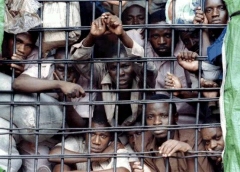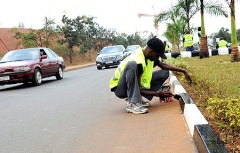Rwanda Government says Amnesty International accusations are �wild�

Kigali – Responding to demands from Amnesty International that the new government must urgently review their “vague ‘genocide ideology’ and ‘sectarianism’ laws” allegedly used to suppress political dissent, the Justice Ministry says it has such a plan but not because of outside pressure.
Rwanda does not make laws to please Amnesty International or any other outsiders, said Justice Minister Tharcisse Karugarama.
The London-based rights group said in a report Tuesday that the loose wording was being misused to criminalise criticism of the government and legitimate opposition.
�The ambiguity of the ‘genocide ideology’ and ‘sectarianism’ laws mean Rwandans live in fear of being punished for saying the wrong thing,” said Erwin van der Borght, Africa Programme director at Amnesty International.
“Most take the safe option of staying silent.”
In a 116-page report, Amnesty says its research based on information from local civil society, judges and lawyers, the two laws were found to be troubling.
But speaking Tuesday morning to the BBC, the Justice Minister Karugarama accused Amnesty International of making baseless allegations without doing any research on the impact of the laws.
�What census have they carried�Are they the spokesperson of the Rwandan people?� said Karugarama, describing the allegations from the group as �wild�.
Government announced in April that it was reviewing the Genocide Ideology law. RNA also reported recently that Karugarama had invited campaigns groups including Amnesty International to give their ideas on the preferred changes.
The complaints against the sectarianism law are just coming up.
Karugarama said: �We do not make laws to satisfy Amnesty International or any other organization�we make laws to satisfy our legal and national requirements.�
Cabinet has engaged two unnamed academic institutions to help with the review of the Genocide law. Karugarama has commissioned two independent groups to look at the law. One is an academic institution in north America, the other a group in Europe.
Available figures suggest some 900 people are in jail over the contested Genocide law.
[ARI-RNA]
August 31, 2010 1 Comment
Rwanda prepares for Kagame’s swearing in ceremony
Final touches ahead of the inauguration

Kigali – Preparations countrywide are in high gear as Rwanda braces itself for the swearing in ceremony of the now UN genocide suspect President-elect Paul Kagame slated for September 6, for his second term in office following a “landslide victory”.
In the capital Kigali, roads have been given a retouch with a new coat of paint while at Amahoro National Stadium, preparations have already began ahead of the Monday fete.
According to the Minister of Local Government James Musoni, Rwandans who will not make it to the national stadium will gather in their villages where they will take part in the national celebrations.
�Citizens at the village level (Umudugudu) have planned extravaganzas. They have already organised cultural troops and composed victory songs to sing on Inauguration Day. They will follow the function on the radio and on televisions for those who can afford.�
�The government has contributed Rwf50,000 to every village to help in the celebrations. This is just a small contribution compared to what has already been done by the people themselves,� Musoni said.
In some villages, bulls will be slaughtered, and according to Musoni, the plan is for Rwandans to celebrate the victory with merrymaking, partly to celebrate the peaceful elections as well as the new chapter that the country will have entered.
�This is what people have voluntarily planned, they say it is their victory and hence they need to celebrate it.�
According to the Mayor of Kigali City, Dr. Aissa Kirabo Kacyira, the city put finishing touches on some city roads that have been undergoing repairs and also put on hold ongoing road works until after the inauguration.
�Preparations are going on well, the roads and the facilities are ready. We are expecting some 90,000 people to come to the ceremony and we have already arranged where they will sit, water points and many other things required for the event to go smoothly,� Kirabo said.
She noted that some sections of the roads had to be repainted as a result of construction works going on, and that some extra cleaning up done on other sections.
The Mayor called on the residents of Kigali to show up on time to be part of the event. She again commended the residents for being vigilant and peaceful during the elections.
August 31, 2010 1 Comment
Rwanda: No order yet to pull out of peacekeeping missions
Kigali – Despite continued reports alleging that Rwanda has threatened to reconsider its UN commitments � including its contribution to UN-backed peacekeeping operations, the Rwanda Defence Forces has said they have no standing order to that end.
Army and Defence Spokesperson, Lt. Col. Jill Rutaremara, pointed out that such a decision would be a political one and not the army�s.
�The army takes orders from political authorities. Such a decision is not ours to make. And, we haven�t been given that order,� said Rutaremara.
Rwanda maintains the biggest contingent on the UN-backed peacekeeping mission in Sudan�s troubled region of Darfur.
Media allegations about Rwanda�s �threat� to pull out of peacekeeping operations came last week following the leak of a UN draft report claiming that Rwandan troops were involved in mass killings in the DRC from 1994-2003.
The real question now is: given the gravity of the genocide allegations minutiously described in the UN human rights report, does the UN need to use the service of a genocidal army for peacekeeping missions? It is not up to Rwanda to threaten to pull out its troops, it should be up to the UN, without delay, to cancel any involvement of Rwandan army in any peacekeeping mission!
August 31, 2010 No Comments
New Amnesty report criticises vague Rwanda laws
Rwanda: “Living in fear of saying the wrong thing”
New Amnesty report criticises vague Rwanda laws
Amnesty International has today [31 August] urged Rwanda�s new government to review its vague laws of �genocide ideology� and �sectarianism� which can lead to imprisonment for up to 25 years.
In its new report entitled �Safer to Stay Silent: The Chilling Effect of Rwanda�s Laws on �Genocide Ideology� and �Sectarianism� Amnesty raised concerns that the laws are being used to suppress political dissent and stifle freedom of speech.
It details how the vague wording of these laws is misused to criminalise criticism of the government and dissent by opposition politicians, human rights activists and journalists.
Amnesty International�s Africa Programme Director, Erwin van der Borght said:
�The ambiguity of the �genocide ideology� and �sectarianism� law means Rwandans live in fear of being punished for saying the wrong thing. Most take the safe option of staying silent.�
Amnesty International found that many Rwandans, even those with specialist knowledge of Rwandan law, were unable to precisely define �genocide ideology�. Even judges noted that the law was broad and abstract.
Accusations of �genocide ideology� have also been used to settle personal disputes. Current laws allow for the criminal punishment of children as young as 12, accused of genocide ideology. Parents, guardians and teachers can all face the threat of �inoculating� a child with �genocide ideology�.
Sentences for convicted adults range from 10 to 25 years� imprisonment.
The �genocide ideology� and �sectarianism� laws were introduced to restrict speech that could promote hatred in the decade following the 1994 genocide. While prohibiting hate speech is a legitimate aim, the approach used by the Rwandan Government has violated international law.
The Rwandan government announced a review of the �genocide ideology� law in April 2010. The government should also launch a review of the �sectarianism� law and demonstrate a new approach to freedom of expression in order to stem the chilling effect of past legislation.
Amnesty International is urging the Rwandan government to significantly amend the laws, to publicly express a commitment to freedom of expression, to review past convictions and to train police and prosecutors on how to investigate accusations.
Erwin van der Borght added:
�We hope that the government review will result in a meaningful revision of the �genocide ideology� and �sectarianism� laws, so that freedom of expression is protected both on paper and in practice.�
Notes to Editors
� Rwanda�s �genocide ideology� law was promulgated in 2008 and the �sectarianism� law was promulgated in 2001.
� According to government figures, there were 1,034 trials related to �genocide ideology� in 2007-2008. These were prosecuted under charges ranging from assassinations to damage to cattle.
� According to government figures, 435 �genocide ideology� cases were tried at first instance in 2009.
� In the lead-up to the 9 August presidential elections two opposition candidates were arrested and charged, among other things, with �genocide ideology�. A newspaper editor was also arrested on the same charge.
� The BBC and VOA have both been accused of disseminating �genocide ideology� by the government. These accusations led to the suspension of the BBC Kinyarwanda service for two months from April 2009.
[Amnesty International]
August 31, 2010 1 Comment
Amnesty International calls on Rwanda to review �genocide ideology� law
The London-based human rights organization, Amnesty International (AI), has said in a new report released here on Monday that Rwanda�s new government must urgently review its vague �genocide ideology� and �sectarianism� laws that are being used to suppress political dissent and stifle freedom of speech.
The report titled �Safer to Stay Silent : The Chilling Effect of Rwanda�s Laws on Genocide Ideology and Sectarianism� details how the vague wording of these laws is misused to criminalize criticism of the government and legitimate dissent by opposition politicians, human rights activists and journalists.
�The ambiguity of the �genocide ideology� and �sectarianism� law means Rwandans live in fear of being punished for saying the wrong thing,� said Erwin van der Borght, Africa Program director at Amnesty International. �Most take the safe option of staying silent.�
Amnesty found that many Rwandans, even those with specialist knowledge of Rwandan law including lawyers and human rights workers, were unable to precisely define �genocide ideology�. Even judges, the professionals charged with applying the law, noted that the law was broad and abstract.
In the lead-up to the August 9 presidential elections in Rwanda, two opposition candidates were arrested and charged, among other things, with �genocide ideology�. A newspaper editor was also arrested on the same charge.
The BBC and VOA have both been accused of disseminating �genocide ideology� by the government. These accusations led to the suspension of the BBC Kinyarwanda service for two months from April 2009.
At a local level, individuals appear to use �genocide ideology� accusations to settle personal disputes. These laws allow for the criminal punishment even of young children under 12, as well as parents, guardians or teachers convicted of �inoculating� a child with �genocide ideology�. Sentences for convicted adults range from 10 to 25 years imprisonment.
The report says that �genocide ideology� and �sectarianism� laws were introduced to restrict speech that could promote hatred in the decade following the 1994 genocide. Up to 800,000 Rwandans were killed in the genocide. Prohibiting hate speech is a legitimate aim, but the approach used by the Rwandan government has violated international law.
The Rwandan government announced a review of the �genocide ideology� law in April 2010. The report however called on the government to also launch a review of the �sectarianism� law and demonstrate a new approach to freedom of expression in order to stem the chilling effect of past legislation.
�The Rwandan government must significantly amend the laws, publicly express a commitment to freedom of expression, review past convictions and train police and prosecutors on how to investigate accusations.
�We hope that the government review will result in a meaningful revision of the �genocide ideology� and �sectarianism� laws so that freedom of expression is protected both on paper and in practice,� said Erwin van der Borght.
[APA-Moscow (Russia)]
August 31, 2010 1 Comment
